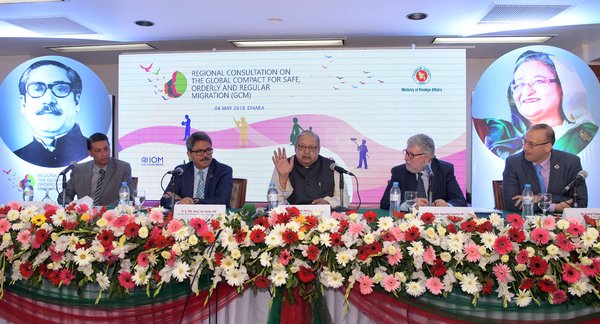Opening remarks by Hon’ble Minister for Foreign Affairs Md. Shahriar Alam, MP at the ‘Regional Consultation of the Global Compact for Migration (GCM)’

Hon’ble State Minister for Expatriate’s Welfare and Overseas Employment
Foreign Secretary,
Distinguished Permanent Representative of Spain to the United Nations, New York,
Excellencies,
Ladies and Gentlemen,
Good Morning.
I take this opportunity to welcome you all to this regional consultation for the implementation of the Global Compact for Migration (GCM) in this historic city of Dhaka. I tank International Organization for Migration (IOM) and International Labour Ogranization (ILO) for their support in organizing this very important regional consultation. Migration is a complex, multi-dimensional global phenomenon, a true reality, an in-built element of human behavior and surely it is here to stay. Bangladesh believes in the protection of the rights of the migrants and, therefore, has been advocating for the appropriate governance of international migration.
You may recall, the Prime Minister of Bangladesh Sheikh Hasina articulated the idea of a Global Compact for Safe, Orderly and Regular Migration in her address to the UNGA in 2016. Since then, our steadfast political commitment to and involvement in the process of developing Global Compact continued. Now, after the adoption of the GCM, our government has taken initiatives to implement the GCM nationally, regionally and globally. Today’s day long consultation is an instance of our initiative to that end.
Excellencies,
Bangladesh looks migration as an integral component of her development aspiration. It is one of the largest countries of origin. In national wealth creation and development- the role of remittance (around 15 billion USD per year) has been immense. We constantly advocate in favor of ethical recruitment, opening up of new legal pathways, responsible migration, decent work, protection of migrant’s rights including that of their family members, lowering the costs of remittance sending, portability of earned benefits, diaspora engagements, and informed and sustainable voluntary return. Bangladesh government is also mindful about the reintegration of returnees and their social and economic assimilation in the society through their meaningful engagement in nation building and backstopping their entrepreneurship potentials. Migration has been embedded in our national development policy to pave our journey to graduate from LDCs by 2024 and a become Developed Country by 2041.
Excellencies,
I passed around 30 years of my life abroad as a migrant/member of diaspora. I know how importance it is to protect the rights of the migrants in foreign lands. First and foremost, we need to understand that migrants are human beings and they have their rights just like us. They also have similar aspirations to live a better and dignified life. Therefore, it summons global response for better managing the phenomenon through better understanding, streamlining migration into respective national policies, enhancing international cooperation in migration and bolstering the global governance of migration through successful implementation of the GCM.
We reaffirm that the Compact process is state-led and state-owned. Already, Bangladesh has gone ahead and finalized a draft national strategy on migration governance in consultation with all stakeholders. In the process, we realized that we cannot but take into account migration in all its forms and manifestations. We have always believed in and practised partnership and consulted with all stakeholders to find solutions to problems and issues. For example, we have concluded an arrangement with the European Union for a humane and mutually beneficial process of return of Bangladeshis. This manifests that even the most critical aspect of migration cycle could be resolved through consultation and partnership.
Ladies and gentlemen,
As we implement the Compact, we should also be aware of issues such as climate change, identity politics, national populist measures, and rapid technological progress all of which will impact the world of work. Also, Bangladesh painfully recognizes that cross-border forced displacement caused by violence, extremism and ultra-nationalism compounds the task ahead of us.
In this backdrop, I would like to mention that since August 2017, around 1.1 million Rohingya from Northern Rakhine State of Myanmar sought refuse in Bangladesh. Bangladesh Government, besides bilateral engagement with Myanmar to solve the problem, despite her resource scarcity has engaged its fullest strength to cope with the humanitarian needs at the ground.
In this context, I would like to highlight that closing the borders to stop the flow of immigrants is not the solution or safeguard to uphold countries sovereign authority. We need to be more rational and less emotional while dealing with international migration.
Excellencies,
For Bangladesh, adoption of GCM is not an end in itself. Rather, beginning of a new responsibility. I am happy that the UN Secretary General has appointed the distinguished Permanent Representatives of Bangladesh and Spain as co-facilitators to the intergovernmental consultations and negotiations to determine the modalities and organizational aspects of the International Migration Review Forum (IMRF). I hope that the co-facilitators would be able to come up with concrete way outs for the implementation of 23 objectives outlined in the GCM.
As we all recognize, migration as a global phenomenon, it remains, perhaps, a continuing imperative for us to engage all in seeking to broaden support for the Compact. Bangladesh reaffirms the crucial and continuing role the civil society and business community has to play in the implementation of the Compact. We have always believed in and practised partnership and consulted with all stakeholders to find solutions to problems and issues.
Dear Friends,
I firmly believe that the eminent experts present here will provide us a deep understanding about the next course of action as well as a detailed work plan for the implementation of GCM in this region.
I am sure that the contribution of the distinguished Permanent Representative of Spain to the United Nations, New York and our Permanent Representative to New York in this discussion would add significant values to this consultation.
I thank all of you for your patient hearing.








